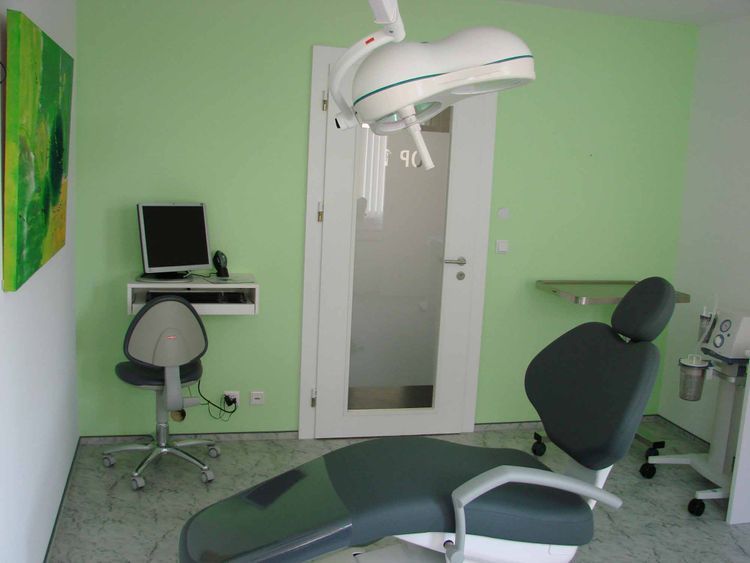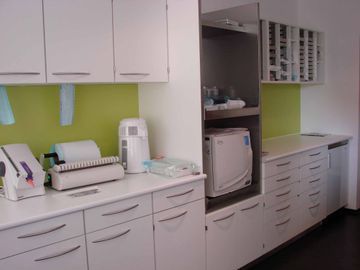Family dentist, school dentist, versatile specialist am Seedamm: a dentist to fit all patients

Who are our typical patients? I think there aren't any typical patients in our practice. Basically, a dentist in Switzerland is a "family dentist" and handles a broad spectrum of people. This is all well and good and the dentist's diligence and ambition is rewarded with the possibility of dedicating himself to his "hobby horses", apart from a varied everyday. Continuous further training and increasing professional experience turn a dentist with ambition into a versatile specialist. As a school dentist, I enjoy the contact with children and attach great importance to atraumatic treatment, since, as a father, I know and understand children, and do this gladly. I only engage in a limited amount of orthodontic treatment with so-called alignment braces for correcting minor flaws. Orthodontics is a specialist discipline and hence should also be practised by specialists. My patient base is a typical section of society and I'm glad of it.
Spoken languages
German, English, Italian, French and Albanian
Means of payment
debit and credit cards, invoice
Prior to treatment, it is important to me that clarity prevails in terms of the desired treatment Goal. A sound plan - within the meaning of the synoptic treatment concept - is prepared in advance. This gives you an individual overview (including alternatives), and creates transparency concerning the duration, type and cost of the treatment. I regard dentistry in theory as a strategic game. During a consultation, we jointly decide the route to take, and hence have transparency and a goal. The priorities then for the actual treatment are maximum protection, pleasant treatment and a sustainable outcome.Listed below, you will find an overview of our offer. Please contact us for an appointment. We will be happy to assist you at any time.

Services
- Emergency treatment and pain relief (same-day appointments usually possible)
- Diagnosis/second opinion
- Individual prophylaxis
- Gum treatment
- Myoarthropathy (bite guards)
- Conservation dentistry:
- Fillings (synthetic)
- Inlays, onlays, partial crowns (ceramic, gold)
- Root canal treatment for tooth preservation
- Crowns (metal-ceramic or full ceramic)
- Veneers
- Bridges (metal-ceramic or full ceramic)
- Prosthetics:
- Synthetic (acrylic, nylon)
- Metal frameworks (CoCrMo)
- Attachment technology
- Telescopic and conical crowns (removable bridges)
- Hybrid prostheses
- Total prostheses
- Surgery:
- Gentle extractions, wisdom tooth removal
- Periodontics
- Resections (root ends, roots)
- Labial frenectomy
- Bone grafting
- Implantology:
- Individual teeth
- Bridges
- Bridge supports
- Snap fasteners
- Cosmetic treatments:
- Aligners (invisible braces for repositioning)
- Veneers, crowns (full ceramic for a natural-looking result)
- Bleaching (at your office or home)
- Sport mouth guards
- Treatment carried out under nitrous oxide sedation or general anaesthesia (Dr Gabriele Dorn)
- Experience in treating patients from specific professions (music, gastronomy, etc.)
- Oral rehabilitation
My team and I are regularly complimented on the focused and discreet way in which we work and interact, which with the calm atmosphere in
the clinic creates a strong sense of trust and feeling of security.
With several decades of experience in dental medicine and its associated disciplines, we are ready to take on any challenge.
Welcome to our clinic,
Your LF team
>>>Welcome<<<
FAQ
Why do I need an annual check-up?
Various studies have shown that annual check-ups, known as recall appointments, are the surest way of detecting problems at an early stage. They help avoid pain, high treatment costs and unforeseen problems, such as toothache on holiday, abscesses, etc. You wouldn’t let your car go too long without a service, would you?
Why do I need to see the hygienist?
Thorough teeth cleaning and scaling protects you from periodontitis, gum disease and possible tooth loss.
In addition, fluoridation measures can help remineralise the teeth in the event of incipient decay, and support and speed up their natural repair mechanism.
Is fluoride harmful?
Unfortunately, the internet is full of negative stories about the ‘fluoride magic bullet’. These are all, without exception, unscientific and without foundation. Every day I see evidence of how avoiding fluoride leads to a higher risk of tooth decay. Those who refuse to use toothpaste containing fluoride are at a disproportionately higher risk of suffering from tooth decay. That’s because in today’s ‘sugar-sweet world’, we consume so much processed food. Consequently, we need to take particularly good care of our teeth, because a healthy tooth will not start to decay.
It’s similar to the situation with vaccination: you only appreciate the benefits of prevention when you’ve experienced the misery of the illness.
What’s the correct way to clean my teeth?
This is really best answered as part of an individual prophylaxis consultation.
I find this film provides useful guidance for most patients
Why do I need x-rays every two years?
Because tooth decay can only be diagnosed conclusively based on a clinical examination and current x-rays. ‘X-ray vision’ helps us assess interdental spaces that are not visible to the naked eye and check existing fillings.
Patients are sometimes worried about being exposed to radiation, but such concerns are unwarranted. Even with panoramic x-rays, the radiation dose is far lower than you would receive by, say, going for a walk at high altitude – something we in Switzerland do far more often than having an x-ray
Why is dental treatment so expensive?
Many patients think dentists’ earnings are very high. But they forget that the added value from a dentist is not the same as that from other service providers. The service you receive from a dentist is multifaceted. In addition to the work of the dentist, it includes the cost of other practice employees, materials and the usual overheads (rent, equipment purchase and maintenance, various insurances, professional development, etc.).
Dental treatment abroad is much cheaper!
Yes, the further away you get from Switzerland, the cheaper the dental treatment becomes. Obviously, in countries where salaries, rents and associated costs are lower, prices for services and materials will also be lower – Hungary is a prime example.
By all means, sign up for a treatment for which you will receive no guarantee or have any legal recourse in the event that something goes wrong.
Over the course of my career, I’ve seen examples ranging from shocking to disturbing. Consequently, the University of Zurich has extended its scale for assessment of dental care to include the level ‘mutilation’. The bargain treatment often leads to tooth loss, which the patient, owing to their negative experience abroad, usually prefers to have remedied at home. Justifiably so, as here ideally they will have access to a reputable doctor, who is better trained and who, not only due to higher ethical standards, will achieve a successful outcome for their patients in the long term.
Zahnarztpraxis Dr. Lothar Frank
Alte Jonastrasse 83
8640 Rapperswil-Jona
Opening hours:
- Mon, Tue, Thu
- -
- Wed, Fri
- -
- Sat - Sun
- Closed
Sa by appointment only


